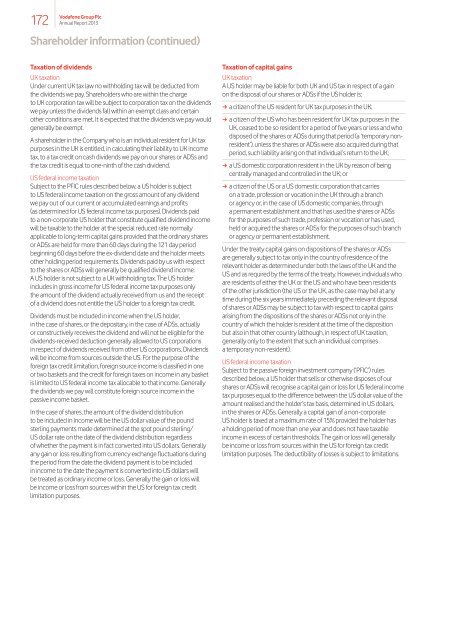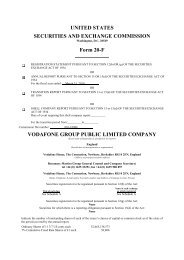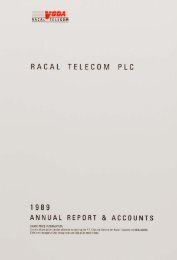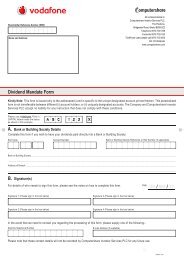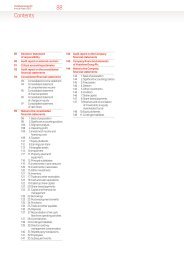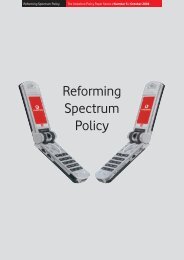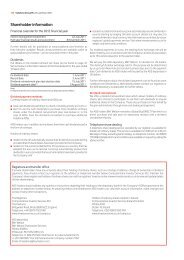The way ahead? - Vodafone
The way ahead? - Vodafone
The way ahead? - Vodafone
Create successful ePaper yourself
Turn your PDF publications into a flip-book with our unique Google optimized e-Paper software.
172<br />
<strong>Vodafone</strong> Group Plc<br />
Annual Report 2013<br />
Shareholder information (continued)<br />
Taxation of dividends<br />
UK taxation<br />
Under current UK tax law no withholding tax will be deducted from<br />
the dividends we pay. Shareholders who are within the charge<br />
to UK corporation tax will be subject to corporation tax on the dividends<br />
we pay unless the dividends fall within an exempt class and certain<br />
other conditions are met. It is expected that the dividends we pay would<br />
generally be exempt.<br />
A shareholder in the Company who is an individual resident for UK tax<br />
purposes in the UK is entitled, in calculating their liability to UK income<br />
tax, to a tax credit on cash dividends we pay on our shares or ADSs and<br />
the tax credit is equal to one-ninth of the cash dividend.<br />
US federal income taxation<br />
Subject to the PFIC rules described below, a US holder is subject<br />
to US federal income taxation on the gross amount of any dividend<br />
we pay out of our current or accumulated earnings and profits<br />
(as determined for US federal income tax purposes). Dividends paid<br />
to a non-corporate US holder that constitute qualified dividend income<br />
will be taxable to the holder at the special reduced rate normally<br />
applicable to long-term capital gains provided that the ordinary shares<br />
or ADSs are held for more than 60 days during the 121 day period<br />
beginning 60 days before the ex-dividend date and the holder meets<br />
other holding period requirements. Dividends paid by us with respect<br />
to the shares or ADSs will generally be qualified dividend income.<br />
A US holder is not subject to a UK withholding tax. <strong>The</strong> US holder<br />
includes in gross income for US federal income tax purposes only<br />
the amount of the dividend actually received from us and the receipt<br />
of a dividend does not entitle the US holder to a foreign tax credit.<br />
Dividends must be included in income when the US holder,<br />
in the case of shares, or the depositary, in the case of ADSs, actually<br />
or constructively receives the dividend and will not be eligible for the<br />
dividends-received deduction generally allowed to US corporations<br />
in respect of dividends received from other US corporations. Dividends<br />
will be income from sources outside the US. For the purpose of the<br />
foreign tax credit limitation, foreign source income is classified in one<br />
or two baskets and the credit for foreign taxes on income in any basket<br />
is limited to US federal income tax allocable to that income. Generally<br />
the dividends we pay will constitute foreign source income in the<br />
passive income basket.<br />
In the case of shares, the amount of the dividend distribution<br />
to be included in income will be the US dollar value of the pound<br />
sterling payments made determined at the spot pound sterling/<br />
US dollar rate on the date of the dividend distribution regardless<br />
of whether the payment is in fact converted into US dollars. Generally<br />
any gain or loss resulting from currency exchange fluctuations during<br />
the period from the date the dividend payment is to be included<br />
in income to the date the payment is converted into US dollars will<br />
be treated as ordinary income or loss. Generally the gain or loss will<br />
be income or loss from sources within the US for foreign tax credit<br />
limitation purposes.<br />
Taxation of capital gains<br />
UK taxation<br />
A US holder may be liable for both UK and US tax in respect of a gain<br />
on the disposal of our shares or ADSs if the US holder is:<br />
a a citizen of the US resident for UK tax purposes in the UK;<br />
a a citizen of the US who has been resident for UK tax purposes in the<br />
UK, ceased to be so resident for a period of five years or less and who<br />
disposed of the shares or ADSs during that period (a ‘temporary nonresident’),<br />
unless the shares or ADSs were also acquired during that<br />
period, such liability arising on that individual’s return to the UK;<br />
a a US domestic corporation resident in the UK by reason of being<br />
centrally managed and controlled in the UK; or<br />
a a citizen of the US or a US domestic corporation that carries<br />
on a trade, profession or vocation in the UK through a branch<br />
or agency or, in the case of US domestic companies, through<br />
a permanent establishment and that has used the shares or ADSs<br />
for the purposes of such trade, profession or vocation or has used,<br />
held or acquired the shares or ADSs for the purposes of such branch<br />
or agency or permanent establishment.<br />
Under the treaty capital gains on dispositions of the shares or ADSs<br />
are generally subject to tax only in the country of residence of the<br />
relevant holder as determined under both the laws of the UK and the<br />
US and as required by the terms of the treaty. However, individuals who<br />
are residents of either the UK or the US and who have been residents<br />
of the other jurisdiction (the US or the UK, as the case may be) at any<br />
time during the six years immediately preceding the relevant disposal<br />
of shares or ADSs may be subject to tax with respect to capital gains<br />
arising from the dispositions of the shares or ADSs not only in the<br />
country of which the holder is resident at the time of the disposition<br />
but also in that other country (although, in respect of UK taxation,<br />
generally only to the extent that such an individual comprises<br />
a temporary non-resident).<br />
US federal income taxation<br />
Subject to the passive foreign investment company (‘PFIC’) rules<br />
described below, a US holder that sells or otherwise disposes of our<br />
shares or ADSs will recognise a capital gain or loss for US federal income<br />
tax purposes equal to the difference between the US dollar value of the<br />
amount realised and the holder’s tax basis, determined in US dollars,<br />
in the shares or ADSs. Generally a capital gain of a non-corporate<br />
US holder is taxed at a maximum rate of 15% provided the holder has<br />
a holding period of more than one year and does not have taxable<br />
income in excess of certain thresholds. <strong>The</strong> gain or loss will generally<br />
be income or loss from sources within the US for foreign tax credit<br />
limitation purposes. <strong>The</strong> deductibility of losses is subject to limitations.


